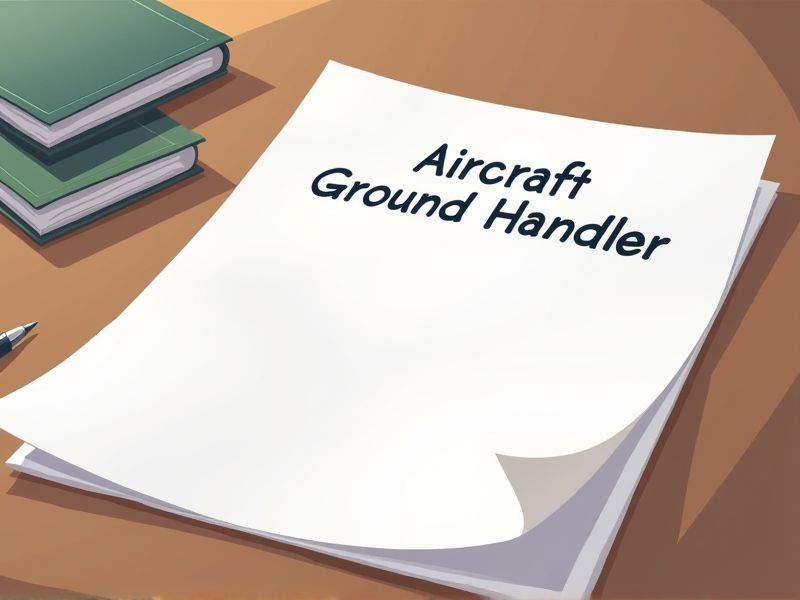
Aircraft Ground Handlers operate in a dynamic environment where safety and efficiency are paramount, necessitating specialized certifications. These certifications equip handlers with essential skills to safely manage and service aircraft, reducing risks of accidents and improving operational workflow. Regulatory bodies mandate these credentials to ensure compliance with aviation standards and foster a culture of safety. Here are some essential certifications you may need to become an Aircraft Ground Handler.
IATA Ground Operations Safety Certification
The IATA Ground Operations Safety Certification is crucial because it establishes standardized safety protocols, reducing the risk of accidents during ground handling operations. Certified ground handlers are proven to improve operational efficiency, which minimizes delays and enhances airline reputation. Airlines gain assurance that safety procedures align with global best practices, lowering insurance costs and potential liability. The certification fosters a culture of safety awareness and continuous improvement among staff, crucial for maintaining high safety standards.
Aircraft Marshalling and Ramp Operations Certification
Aircraft Marshalling and Ramp Operations Certification ensures ground handlers understand standardized signals and procedures, reducing the risk of accidents during aircraft movements. Certification provides handlers with essential knowledge on managing airport ramp complexities, enhancing overall safety and efficiency. Certified handlers demonstrate proficiency in communication and coordination, crucial for successful aircraft parking and servicing. Through certification, handlers meet regulatory standards and industry requirements, building trust in their capability to maintain safety and operational integrity.
Load Control and Weight & Balance Certification
Load control and weight & balance certification ensures an aircraft is stable and performs optimally during flight. Incorrect weight distribution can lead to safety risks such as difficulty in maneuvering or increased fuel consumption. Ground handlers with this certification can efficiently load cargo and passengers, minimizing delays and errors. Compliance with these regulations also safeguards against potential financial penalties and reinforces operational standards.
Aviation Security Awareness Training
Aviation Security Awareness Training for Aircraft Ground Handlers is imperative to mitigate risks associated with unauthorized access to restricted areas. Training enhances the handler's ability to detect and respond to potential threats, ensuring passenger and crew safety. It ensures compliance with international and national aviation security regulations, reducing the operator's liability. Well-informed ground handlers contribute to the overall efficiency and security of airport operations.
Airport Emergency Response Certification
Airport Emergency Response Certification is crucial for aircraft ground handlers because it ensures they are prepared to manage unexpected incidents safely. This certification provides specialized training in emergency procedures, minimizing potential hazards. In crisis situations, certified handlers can efficiently execute coordinated actions, reducing response time. Without this qualification, there is an increased risk of mishandling incidents, which could lead to safety breaches and operational disruptions.
Hazardous Materials Handling Certification
Hazardous Materials Handling Certification ensures that an aircraft ground handler understands the necessary safety protocols for managing potentially dangerous substances. This certification helps reduce the risk of accidents that could arise from improper handling of hazardous materials at an airport. Regulatory compliance is required by aviation authorities; therefore, certified handlers ensure that airlines meet legal obligations. Effective management of hazardous materials can prevent costly delays and enhance overall operational efficiency for airlines.
First Aid and CPR Certification
Aircraft ground handlers often encounter high-risk environments, exposing them to potential emergencies; a First Aid and CPR Certification ensures swift, effective response to medical incidents. Enhanced preparedness decreases the likelihood of severe outcomes during health crises, thereby increasing passenger and crew safety. Regulatory bodies mandate such certifications, aligning with global aviation safety standards and protocols. Competence in emergency procedures reinforces the reliability and efficiency of airport operations, directly impacting operational continuity.
Fire Safety and Rescue Certification
Fire Safety and Rescue Certification ensures aircraft ground handlers are prepared to effectively respond to fire-related emergencies, reducing potential harm and damage. Certification provides them with the necessary skills to safely operate fire suppression equipment and perform rescue operations during critical incidents. Knowledge in fire safety protocols minimizes risks associated with aviation fuel and hazardous materials commonly present in airport environments. Certified personnel contribute to overall aviation safety standards, enhancing passenger and crew safety on the ground.
Occupational Health and Safety Certification
Occupational Health and Safety Certification ensures that aircraft ground handlers adhere to industry safety regulations, reducing the risk of workplace accidents and injuries. Certification enhances the competence of personnel in managing hazardous materials and equipment, crucial for maintaining operational efficiency. It fosters a culture of safety awareness, promoting proactive identification and mitigation of potential hazards in the airport environment. Regulatory compliance with safety standards through certification often results in fewer operational disruptions and financial penalties.
Airport Operations and Customer Service Certification
Certification in Airport Operations and Customer Service is essential for aircraft ground handlers because it ensures they understand safety protocols and regulatory compliance. It verifies their ability to efficiently manage ground support equipment and streamline aircraft turnaround processes. This certification equips handlers to communicate effectively with flight crews and other airport personnel, which reduces the risk of errors. Airlines and airports gain increased operational efficiency and customer satisfaction when staff are properly certified.
Summary
By obtaining certifications, you can enhance your credibility and trustworthiness in the aviation industry. This often leads to better job opportunities and potentially higher income due to recognized expertise. Your operational efficiency is likely to improve as you gain updated knowledge and skills. Furthermore, certifications can bolster your confidence, enabling you to handle complex tasks more effectively.
